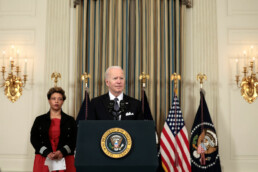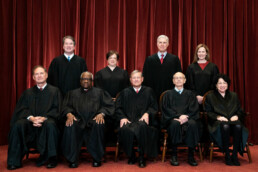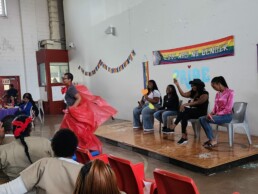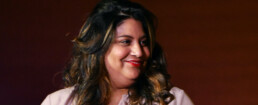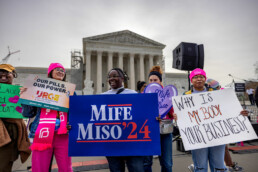Three Questions About Disinformation
 July 16, 2024 Evening, Meteor readers, So, I trust everyone had a relaxing, uneventful, downright mundane weekend void of any alarming or paradigm-shifting news? We wish. Let’s get straight to it. In today’s newsletter, we’re jamming to J.D. Vance’s greatest hits, including his number one single, “Mr. Trump is unfit for our nation’s highest office.” Blast it through the speakers. We’re also asking media critic Jennifer L. Pozner three questions about how to stop the spread of disinformation during violent moments. Is this real life, Shannon Melero  WHAT'S GOING ON JAMES DAVID VANCE. OUR COLLECTIVE NIGHTMARE IN HUMAN FORM. (VIA GETTY IMAGES) J.D. Vance (the D stands for “Don’t let this man in the White House”): As you’ve probably heard by now, Donald Trump has chosen author and Ohio junior senator J.D. Vance as his vice president. There’s already been a bit of ink spilled about Vance and his…policies, if we want to call them that. But what are the thoughts rattling around in his anti-abortion, isolationist, anti-LGBTQIA+, conspiracy theorist, far-right head? Well. He certainly isn’t a fan of women or their bodily autonomy: On abortionIn a local Ohio cable news interview in 2021, when asked if abortion bans should have exceptions for rape or incest, Vance said, “It’s not whether a woman should be forced to bring a child to term, it’s whether a child should be allowed to live, even though the circumstances of that child’s birth are somehow inconvenient or a problem to the society.” A year later, Vance (out loud where people could hear!!) also likened abortion to slavery. Ahead of being announced as the choice for VP, Vance conveniently softened his abortion talking points in an interview with Meet the Press. The entire nation calls bullshit. On domestic violenceIn a 2022 anti-abortion forum, Vance said, “The entire idea that you can discard your husband or your wife like a piece of clothing is one of the most dangerous assaults that we’ve ever seen on the family in this country. If we want children to grow up with healthy, happy lives, we should be reminding them that the most important thing that we can do for our kids is make sure they grow up with a mom and dad at home.” In other words: Domestic violence is not a reason to get divorced. His assertion that children are only going to be healthy and happy if a “mom and dad” are present also underpins his anti-LGBTQ+ stances. On gunsAnd since we all have gun violence at the top of our minds this week, what has Vance said about that? “I think that we have to ask ourselves: What is the real gun violence problem in this country, and are we legislating in a way that solves fake problems? Or solves real problems?” This was in response to a proposed bump-stock ban (which he voted against). As far as solving “real” gun problems, Vance has rejected a number of measures that would make it harder to obtain a firearm and said he was in favor of dismantling the ATF, which (you guessed it) seizes illegal guns. Define real problems, James David. TL;DR: This is not a viable vice presidential candidate; this is a nightmare, and a clear sign that the now-formally-nominated Donald Trump has no plans to modify his far-right stances in a second term. AND:
 THE ONE AND ONLY SHANNEN DOHERTY (VIA GETTY IMAGES)
 Three Questions About...DisinformationLast Saturday was a moment of mass panic. One feminist media critic has ideas about what could have gone differently.BY SAMHITA MUKHOPADHYAY  NO COMMENT. (VIA GETTY IMAGES) When the mass shooting at the Trump rally happened on Saturday, I was unclear how to respond. Disbelief and adrenaline coursed through me, and the moment I logged onto Instagram, the content was flying: everything from earnest (“This is not who we are!”) to snark (“This is why Democrats need access to guns!”) to cries of “It’s a hoax!” As a journalist, I knew this should be a wait-and-see moment, but instead, I was faced with the reality of how quickly unhelpful—and downright untruthful—messaging can spread. What gave me solace was a measured list of media literacy strategies posted by my friend Jennifer L. Pozner, a journalist and long-time media educator with an upcoming graphic novel about critical media literacy. So, I called to ask her to elaborate. What was the first thing you noticed when the news broke about the shooting? Jennifer Pozner: The first piece I saw from a credible outlet was on NPR’s website, and the comments under the story included someone telling NPR it was their fault, another implying that it was staged, and a third laughing at Trump’s bloody ear. Legitimate news reporting is a time-consuming process. During chaotic events, ethical reporters have to vet sources, fact-checkers need to do their best to confirm the story, and they all need to work carefully to ensure that they’re giving the public accurate information. You know what takes no time at all? Bullshit. Bullshit is instantaneous. Rumor, propaganda, bots, and bad actors always pop up right away, flooding the zone with disinformation and conspiracy theories to fill every short-term information vacuum. This is a collective societal problem, but we contribute to it individually when we react without thinking critically… That’s dangerous because disinformation is sticky. When disinformation infuses the immediate narrative, it can be hard to convince people of reality even after the facts have been verified. You had a great social post about what to do instead of posting immediate reactions. Can you summarize what you suggested people do in a moment like this and why? It’s important to wait for verified reporting to establish the facts. And we should denounce political violence without condition—even when the target has often encouraged political violence against his perceived enemies. Don’t share false stories, even to mock them: You may think something is so outrageous no one could possibly believe it, but many do…Those potshots could just end up reinforcing the disinformation to others. Outrageous claims need air to multiply; suffocate conspiracies by depriving them of attention. Debunk, don’t distribute: Share accurate information and analysis in plain language and explain how you know particular falsehoods are untrue (without sharing the original lies themselves). Bad actors (including domestic propagandists, Russian and Chinese troll farms, and money-motivated bot operators) use moments like these to pit Americans against one another and foment hate. Don’t fall into those traps. Lower the volume. Don’t debate those who aren’t engaging in good faith, and moderate your social feeds to block trolls and anyone who seems sketchy from poisoning the dialogue. Remember, everything we say publicly can impact other people and possibly contribute to an escalation of violence or conspiracy (and screenshots are forever). Fears, ugly thoughts, and dark humor are deeply human, and it’s OK to express them. But if we want to avoid doing harm, we should really only share them with our “inside voice”: offline in the context of conversations with trusted friends. What is your take on political violence and how we should and shouldn’t talk about it? I thought this was astute in making the case that attacks on politicians are par for the course in the U.S. Looking to the public record and to history can often provide crucial context, as it does here. The Times usefully reminds us that four U.S. presidents have been murdered, along with at least six serious failed additional assassination attempts. What it doesn’t mention is that while this violence has been aimed at both parties’ heads of state, only Trump and the GOP have been explicitly encouraging political violence against “the other side.” Everyone seems to have forgotten that Trump himself made a not-so-subtle assassination threat/dog whistle against his rival, Hillary Clinton, at a 2016 campaign rally. Many journalists, politicians, and historians have accurately situated Trump and the MAGA movement’s policy agendas, statements, and behaviors as consistent with fascism. It’s a routine project for autocratic regimes to threaten violence against their rivals, discredit the press, encourage the public to distrust truth itself (remember “alternative facts”?), revel in mockery and intimidation of minority groups, and paint reasonable disagreement as tantamount to treason—all of which Trump and his acolytes have done. Now, the GOP wants us to believe that acknowledging the history and workings of fascism is so inflammatory and dangerous it must be the reason a 20-year-old lone gunman shot the former President and killed another rallygoer. All their social media posts and press interviews flogging this point aim to distract from clear fact: America is a nation plagued by mass shootings carried out by angry, young gunmen, and Democrats and progressives have not been the ones calling for political violence.  FOLLOW THE METEOR Thank you for reading The Meteor! Got this from a friend? Subscribe using their share code or sign up for your own copy, sent Tuesdays and Thursdays.
|
![]()
Will He, Won't He
 July 11, 2024 Good evening, Meteor readers, Do you have a moment to talk about our lord and savior, Arlette Amuli? No, but seriously. I know a lot of you are fans of dating shows, and Amuli is the creator and host of the most riveting dating show I have seen since Blind Date (the original, not the reboot). It’s called Pop the Balloon or Find Love. You can catch it on YouTube and thank me later, especially after you’ve gone through the emotional roller coaster that is “Doctor Elom.” IYKYK. In today’s newsletter, we wade gently into the murky waters of President Biden’s campaign. While some Democrats are standing firmly with him, others are looking over his shoulder to see who might be next (we do have a vice president, right?). Plus, Scarlett Harris talks to writer Emma Specter about her new memoir More, Please, and your weekend reading list. 🧷🎈♥️, Shannon Melero  WHAT'S GOING ONDance of Democrats: The will-he-or-won’t-he saga of President Biden’s 2024 run might feel like a breezy House of the Dragon subplot if only the entire concept of representative democracy in the U.S. weren’t at stake. This week, calls for Biden to step aside for a more viable and virile candidate increased, with multiple Democratic congresspeople weighing in. Even George Clooney, of married-to-Amal fame, wrote an op-ed about how Biden should make way for a new nominee, which is notable since Clooney raised $28 million for Biden just three weeks ago. “We can put our heads in the sand and pray for a miracle in November,” he wrote, “or we can speak the truth.” So far, Biden has doubled down in response to the growing fears over his ability to beat Trump and the Project 2025 army, but there are signs of tiny cracks in his resilience: the New York Times reported today that the campaign is conducting a survey about whether voters might prefer Vice President Kamala Harris at the top of the ticket in a match-up against Trump. And as the Times notes, a lot rests on the (unscripted) news conference Biden is delivering tonight in the wake of the NATO summit: If it goes the way of the debate, party leaders might defect from Biden. (Harris, or Gretchen Whitmer, or Gavin Newsome, or JB Pritzker have all been floated at various times as Biden replacements.) There’s also the question of whether the Democratic Party would have already asked Biden to step aside if VP Harris were white and a man—even though a recent poll showed her chances of beating Trump are better than Biden’s. (Some progressives have even been rallying around the “KHive” on social media, which has been flooded with enthusiastic jokes about loving context and coconut trees.) Either way, the Democratic Party needs to straighten out its shit quick—there are only about 16 weeks until the election, and beating an autocratic rapist felon should simply not be this fraught. Democracy, as the DCCC texts keep reminding me, hangs in the balance. —Julianne Escobedo Shepherd AND:
 SHELLEY DUVALL (VIA GETTY IMAGES)
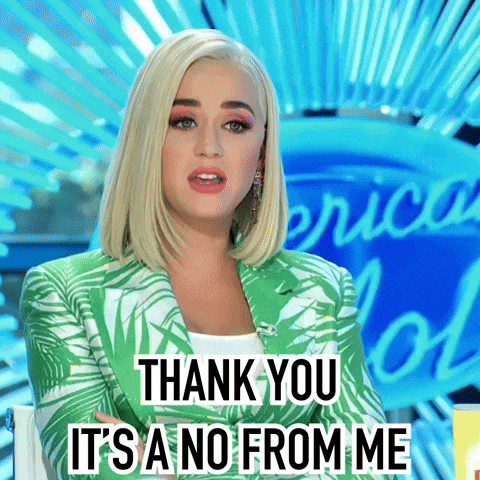
 BOOK TALKGiving Oneself Permission to Want MoreWriter Emma Specter on her new memoir about binge-eating, coming out, and fat acceptance.BY SCARLETT HARRIS  EMMA SPECTER ENJOYING DESSERT WITH A SIDE OF HER NEW BOOK (SCREENSHOT VIA INSTAGRAM) Landing a culture-writer position at Vogue five years ago was a dream job for Emma Specter. But on their first day, they had to call out sick after a particularly brutal binge-eating session, a disorder they’ve struggled with since childhood. “My eating disorder was so out of control that I’d managed to let it rob me of my first day at Vogue,” Specter writes in her thoughtful, unflinching new memoir, More, Please: On Food, Fat, Bingeing, Longing, and the Lust for “Enough.” Since then, Specter has carved out a niche at Vogue which she calls “the body beat,” helping to bring body-positive content to a publication that has historically been anything but. “I’m glad to say that offering something different has been really rewarding,” Specter tells The Meteor. “I think there is a hunger within women’s media for stories that… speak to a larger range of experiences.” In More, Please, Specter explores how they began “coming around to the idea that more can be good. While Specter is delighted by the early praise for More, Please, she “hope[s] that we get to a point where this book is no longer relevant because it’s not newsworthy that a fat person is vaguely at peace with themselves.” Scarlett Harris: This book is not only the journey of your binge-eating disorder and fat acceptance, but of coming to terms with your queerness. Did you always know you wanted those ideas to be intertwined in the narrative of this book? Emma Specter: Before I started writing, I hadn’t really thought of queerness and disordered eating as being as linked as they were. But it was impossible to move into a phase of my life in which I was dating the people I wanted to date, being aware of my sexual and gender identity…and not also want to investigate why I’m consistently making choices with food that feel bad and hard for me. The [binge eating] behaviors weren’t necessarily new or specific to when I came out, but the desire to understand them more and have them become less frequent definitely felt linked. You write about all the ways you tried to whittle yourself down to a certain mold women are taught we should fit, especially when you were dating cishet men. You’ve since found happiness and acceptance in your body and the queer community, but did you have a similar feeling when you were first dating women? I thought I would be, but when I actually started dating and having romantic and sexual experiences with people whose bodies looked similar to mine or were sorted on the same gender scale as mine, it really was the last thing on my mind. There was plenty of anxiety around coming out for me, but as an out and fat person now, I do feel a sense of relief that I don’t have to sort my life around trying to appeal to men anymore. No queer relationship freed me from that forever—it’s still something I have to negotiate—but it’s an incredible freedom to acknowledge that I was living my life chasing the approval of men and be able to release that. You quote in the book a 2022 study by the Trevor Project that found that members of the LGBTQIA+ community are more likely to experience eating disorders. Did learning about that change how you [thought about] your own eating disorder? I had this wrong idea when I settled into queer identity…that since I was out now, everything else in my life must fall into place, because that was the answer I was searching for my whole life of why I didn’t feel like I fit in in certain places, or why I didn’t feel comfortable in my own body, or why I didn’t have a good relationship to sex. But coming out was just the beginning. I wish it weren’t the case that it’s such a common thing among queer, trans and gender-nonconforming people to feel bad inside your body. Food or exercise or messing with how your body looks and feels is always accessible, and is there for you when it feels like nothing else is. It’s such a common response to a systemic problem. So often when we think of those who suffer from eating disorders, the image we have in our minds is of an underweight person. How important was it for you to highlight that eating disorders come in all forms and particularly how they affect fat people? So important. It’s really hard to see yourself making your way to a place of recovery when you feel like you’re not represented in recovery narratives. There is an erasure of dignity [in] society’s incredulosity that a fat person struggles with an eating disorder. I feel that everyone struggling with disordered eating should be afforded a level of respect for the process of healing that, unfortunately, most of us don’t get. The title, More, Please, and part of the subtitle, “The Lust for Enough,” have multiple meanings. Can you talk a little about that? My editor Rachel Kambury pointed out the many meanings that More, Please could have—not just [about wanting more food] but also wanting more from my personal life, wanting more from my professional life, and giving myself permission to want more. I’m coming around to the idea that more can be good. It’s a celebration of saying: What if I was open about my desires?  WEEKEND READING 📚On broken promises: Ahead of the Olympics, Paris has been much praised for its strides to clean up the city and lessen the carbon emissions from the games. But part of that plan has included busing unhoused people out of Paris, luring them with the promise of housing elsewhere. An investigation found something much different. (The New York Times) On the meaning of words: Why are we still using the word “porn” to describe sexually explicit non-consensual images? (The 19th) On bad influences: The extremist anti-abortion activist whose draconian, self-published book is shifting Republican politics. (ProPublica)  FOLLOW THE METEOR Thank you for reading The Meteor! Got this from a friend? Subscribe using their share code or sign up for your own copy, sent Tuesdays and Thursdays.
|
![]()
What Is "Fascism Lite"?
 July 9, 2024 Greetings, Meteor readers, Wow, is it hot in here—or is it just the planet’s core temperature rising to levels that are becoming unsustainable for human life? The last few days on the East Coast have been the hottest of my lifetime, and Texas is being battered by Hurricane Beryl. I and the entire Meteor team hope that wherever you are you’re staying cool and, above all, safe. In today’s newsletter, Cindi Leive asks Nelini Stamp, the national organizing director at the Working Families Party, three questions about democracy—and finds out the difference between “fascism lite” and “fascism 5G.” And speaking of important questions, we’re also asking ourselves and the universe why there’s a Gladiator sequel coming out. Shannon Melero  WHAT'S GOING ON
 Political organizer Nelini Stamp breaks down our election reality, and the danger of “fascism 5G”BY CINDI LEIVE  NELINI STAMP ROCKING THE STAGE FOR DEMOCRACY (VIA GETTY IMAGES) It’s been a tumultuous few weeks for anyone who cares about this country’s future. Extreme Supreme Court rulings! That terrifying debate! Fast-flying opinions on whether Biden should step down to avoid a Trump victory, and who’s supporting him or isn’t as he decides. (This, on the Kamala of it all, was especially good.) But one of the few people on my feeds who has seemed calmest through it all is Nelini Stamp, the national organizing director of the Working Families Party. Naturally, I had questions. (Per the rules of this column, three of them.) Cindi Leive: I’ve been following you the last few weeks [since the debate] and noticed you are not freaking out. Why? Nelini Stamp: I guess I sort of feel like: We have what we have. I think that we all knew from 2020 that these would be the two [candidates] that would probably match up. And so as a person who does electoral politics, I've been holding the complexities of this moment for quite some time. To me, the strategy is, we block this awful, awful, awful authoritarianism that is coming down the pathway—Project 2025—and we build infrastructure so that it doesn't happen to us again. Political and electoral infrastructure that allows us to put what I see as the actual future of our society in office: young people in office, more diverse voices in office. More progressive voices in office! We need to build the infrastructure of folks who will fight for working people, LGBTQ people, for reproductive justice, and for the world we want to see. To me, this election is about blocking terrible stuff and finally saying that we have to create alternative [structures]. The Working Families Party is a third party. But we are also pragmatic: It takes a lot of resources and infrastructure to get [a third-party candidate] on the ballot. And we would have to fight secretaries of state in places that are not too kind. Given the terrain that we’re on—the Supreme Court and all that—is that something that I feel uneasy with? Of course. Do I feel uneasy with Biden and Trump both running? Of course. But that is the reality that we’re living in right now. You’re talking about the "block and build" theory. Can you explain that? To be quite frank, pre-Israel/Gaza I was ready to be the most red-white-and-blue I've ever been. Because Biden has been the most worker-oriented president in my entire lifetime….and there has not been one president since FDR that was able to move such a [worker] agenda, with climate at its focus too. And so I was right here, bells and whistles, give it up for Biden, give me that Dark Brandon shirt! And then October 7 happened. It was a tragedy among tragedies, and what we’ve seen unfold as the response to it has been a tragedy among tragedies. At the Working Families Party, we were like—what is our strategic orientation? A lot of us don’t want to be bells and whistles for Biden, but we need to block right-wing authoritarianism so we can build the future we do want to see. Look, I know how many cycles we have been saying, “You have to vote for this person to stop this person.” But now we know, in writing, with Project 2025. We know the agenda. Before it was like, Abortion is at risk. But now it is a full frontal attack on all of our lives. It is an attack on workers. It is an attack on people who can get pregnant, it is an attack on women. It is an attack on LGBTQ rights—everything we’ve gained in my lifetime will be gone in a moment. And in those conditions, on that terrain, what are we going to be able to build? We're going to be on defense mode. We want to be able to block that—and build infrastructure that is not just controlled by the Democrats or Republicans. A lot of people say, “I don’t want to vote for any of these candidates.” But we must use all the tools in our toolbox. A [vote] doesn’t mean that you are endorsing the system. We also need to think about the world that fascism actually brings. I was on a panel with my friend Nadya, who was one of the founders of Pussy Riot….[and it made me think], in the United States, we have “fascism lite.” Like, the NYPD acts like fascists a lot. People who can get pregnant are under fascism. Trans people are under fascism. We all deal with it in certain parts of our lives, but we do not understand what full-blown fascism is like: There is not one single artist in Russia that is not locked up right now! We really don't understand what fascism over every single part of everyone's life is like. I think the people in this country who understand fascism most are incarcerated and formerly incarcerated folks. The government literally has a different set of laws for them. But for most people, right now, we have...fascism lite. We don’t have fascism 5G. We have a beta version. And I do not want to see the fully cooked version. Fascism 5G is a terrifying concept. So last question: What is making you feel hopeful right now, if anything? I’m hopeful about all the gains that workers have made—the UAW workers, auto workers, are continuing to organize new members because they had momentum, and they had a good NLRB [National Labor Relations Board] on their side. I know that that’s very wonky, but they had the terrain on their side to win the most gainful things that auto workers have won in [a long time]. These are things that make me hopeful.
 FOLLOW THE METEOR Thank you for reading The Meteor! Got this from a friend?
|
![]()
SCOTUS Anoints a “King Above the Law”
 July 2, 2024 Hello, Meteor readers, Emphasis on the hell, amirite? The last few weeks have been a horrific look into how far our now exceedingly right-wing Supreme Court will go to decimate the government in service to one aspiring autocrat (and their own billionaire benefactors). So much has happened since even yesterday; the disastrous debate feels like a million years ago.  But! We’ve got you covered, with an explainer on what exactly the Supreme Court presidential immunity ruling means. (Spoiler: its whole point is chaos.) And overseas, Mariane Pearl illuminates the far-right victories in France’s snap elections and why President Macron even called a snap election in the first place. (Spoiler: he is a dumbass.) All you fascists bound to lose, Julianne Escobedo Shepherd  WHAT'S GOING ONKing for a day (or forever): Yesterday, as you surely know, the Supreme Court weighed in on the concept of presidential immunity from prosecution—which, when a convicted felon is running for president, feels quite pressing. In a 6-3 decision, the Court ruled that presidents have full immunity for “official” acts, but not for “unofficial” acts—and it is up to the lower courts to determine what differentiates one from the other. There’s a lot of talk about the long-term implications of such a ruling and what the “official”/“unofficial” divide even means. But let’s be honest: This whole thing is confusing. So let’s look at it in the simplest terms possible. First, there is the immediate effect of the ruling: Donald Trump is already trying to overturn his hush-money conviction in New York. As a result, his sentencing will be delayed while the courts wait for the appeals process to sort itself out. And his charges related to January 6 probably won’t be brought to trial until after the election—or ever—as Washington, D.C. Judge Tanya Chutkan hears whether he was acting in an “official” capacity when he tried to block Biden’s presidency from certification. Then there’s what this means in the long term. In 2016, Trump infamously said that he could shoot someone on Fifth Avenue and get away with it. Let’s apply the ruling to that statement to better understand the fresh hell the Supreme Court hath wrought.  PROTESTORS GATHERED OUTSIDE THE COURT YESTERDAY TO VOICE THEIR THOUGHTS ON THE DECISION. (VIA GETTY IMAGES) If Trump, as president (🤮), shot some guy he didn’t like on Fifth Avenue himself, that would not be an “official act,” and he would be open to prosecution. But if Trump, as president (again, 🤮), called Seal Team 6 from the White House and said, “There’s a man I think is a terrorist on Fifth Avenue, take him out,” that is an “official” act, even if the man on Fifth Avenue was not a terrorist—and it would technically fall under immunity. (I’ll come back to this, stay with me.) But here’s the big hitch in the giddyup: Because the Supreme Court chose to lob this back down to the lower courts, they’ve given any future president something more potent than immunity—and that is cloud cover. Ostensibly, any president will now be emboldened to act in any horrific manner they see fit and simply claim that they’re doing so in an official capacity. And knowing how high the bar is to bring forth a charge, they can rest safely in the feeling of immunity. Bringing back the Seal Team 6 example: Say Trump instructs them to shoot a random guy on Fifth Avenue. Trump is, in the immediate, immune. But say the victim’s family wants to seek justice. Prosecutors would first have to prove the act was “unofficial,” untangle the immunity web, and land a favorable ruling; only then could they bring a charge. That’s months or years of legal work just to BRING FORTH A CHARGE. [The infamous “we’re talking about practice” speech begins to play in the background. IYKYK.] The wheels of justice were never meant to turn this slowly. In other words, as Justice Sonya Sotomayor wrote in her dissent: “In every use of official power, the President is now a king above the law.” —Shannon Melero AND:
 BONJOUR!Why Are French Women Voting Against Themselves?Ahead of the second snap election, Marine Le Pen's anti-feminist, far-right party gains powerBY MARIANE PEARL  SOME PEOPLE HAVE HUNGRY EYES AND SOME PEOPLE HAVE FASCIST EYES. (VIA GETTY IMAGES) As the U.S. faces an impending election and threats from the far-right, an ally across the ocean grapples with its own extremist resurgence right now. On July 7, France will vote in the second round of its snap parliamentary elections, which President Emmanuel Macron called to try to undermine the success of the far-right National Rally (RN) party, led by the charismatic, fascistic, anti-feminist Marine Le Pen. During the European elections in early June, Le Pen secured a third of the votes—twice more than the President himself. The snap election, then, is a risky gamble through which Macron hopes to reassert his political authority by gaining a clearer majority at the National Assembly—the French equivalent of the U.S. House of Representatives. Unfortunately, it's not going well. The first round of elections on June 30 put the RN ahead with about a third of the votes. (The leftist New Popular Front came in second, with Macron's centrist alliance in last place.) It looks increasingly likely that the presidential alliance will lose its relative majority in parliament to Le Pen's party—and that women voters are a determining factor, with 33 percent voting for the RN in a 2024 poll, compared to 30 percent of men. (That's a 12 percent increase in female support from 2019.) Even if the RN doesn't win an absolute majority, it could still become the largest party in the country—and thus have Jordan Bardella, Le Pen's 28-year-old protegé, become prime minister, a role whose political power is second only to the president. Like Le Pen, Bardella is pushing for the party’s “de-demonization”—a strategy meant to normalize a group traditionally known as fascist insurgents—and he's especially focused on women, stoking anti-immigration and anti-Muslim fears while reframing them as supposedly feminist. His language plays on extreme nationalism and the trope of Western supremacy; in a 2023 speech to the European parliament, he declared, “Our European values will always be outstandingly superior to those which enslave women [and] imprison them behind headscarves." Ahead of the snap elections, thousands of people rallied in Paris against the RN's regressive stance on women's rights—particularly reproductive rights. The National Rally, which has opposed women's rights since its founding in 1972 and more recently opposed enshrining abortion rights in the French constitution, has historically voted to stop funding family planning organizations, moved against gender equity in the workplace, and proposed subsidizing women who want to stay at home to raise their children. In LePen's 2017 political manifesto, she mentions the word "woman" only twice across 144 proposals, and only in reference to family and safety. For feminists, such a fact is revealing enough. As the French philosopher Camille Froidevaux-Metterie wrote this month in Le Monde, “For women, voting for the RN is like pointing a gun at yourself.”  ANOTHER ANTI-FASCISM RALLY IN TOULOUSE AHEAD OF THE SECOND ROUND OF PARLIAMENTARY ELECTIONS. (VIA GETTY IMAGES) None of this started with Marine herself; in fact, the National Front—the RN’s original name, until it was rebranded in 2018—is a family business. Jean-Marie Le Pen, Marine’s father, founded the party with former Nazis who fought with the extremist Waffen SS during the second world war, as well as former members of the OAS, a far-right paramilitary organization which conducted terrorist operations during the Algerian war. Jean-Marie Le Pen is well-known for his xenophobic, Islamophobic, and misogynistic views; he once stated that the Nazis’ gas chambers were but “a detail” in the history of WWII, and that the idea that women should have ownership over their bodies was “ludicrous.” Marine Le Pen took over for her father in 2012 and has since proven herself much shrewder, particularly in the way she weaponizes her gender. In 2016, for instance, she wrote that “the migrant crisis signals the beginning of the end of women’s rights.” Le Pen regularly demonizes Islam, linking the hijab and burqa with religious oppression; with the RN’s victory on June 30, French women who wear hijab are terrified of what’s next. “Knowing that 10.6 million people voted for a party promoting the ban of the veil in the public space is hurtful,” one 22-year-old told Al Jazeera this week. “I am feeling betrayed by France.” A GLOBAL RIGHTWARD SHIFT France and the U.S. aren’t alone: Hard right governments and parties are advancing around the world. This week alone, Italian Prime Minister Georgia Meloni has made plans to rewrite the country’s constitution in order to gain more power. In Germany, the far-right AfD—which has mimicked Nazi slogans, excused the actions of the SS, and repressed protesters at its annual conference—came in second in the European Parliament elections. The Netherlands has just ushered in its own far-right government, and last month, Spain’s hard-right Vox Party held a rally with far-right leaders from around the world, including Argentina’s Javier Milei, Hungary’s Viktor Orbán, and Israel’s Amichai Chikli. One thing these political parties have in common is their vicious Islamophobia, and, relatedly, their virulently racist views on immigration and regressive approaches to the role of women. History tells us that fascism starts with the demonization of the most vulnerable among us—and that one of the surest antidotes is the political organization of progressive women. “It is not a coincidence that women’s equality is being rolled back at the same time that authoritarianism is on the rise,” wrote Erica Chenoweth and Zoe Marks in Foreign Affairs. “Aspiring autocrats...have good reason to fear women’s political participation: when women participate in mass movements, those movements are both more likely to succeed and more likely to lead to more egalitarian democracy.”  Mariane Pearl is an award-winning journalist and writer who works in English, French, and Spanish. She is the author of the books A Mighty Heart and In Search of Hope.  FOLLOW THE METEOR Thank you for reading The Meteor! Got this from a friend?
|
![]()
SCOTUS Is Dismantling the Government
 June 27, 2024 Evening, Meteor readers, The Robed Ones have been busy this week, so let’s jump straight into it and save you a little time (since we’ve all got a debate to attend). In today’s newsletter, we’re talking about the latest decisions coming down from SCOTUS, plus Scarlett Harris gives us a primer on climate fiction, a sci-fi genre which deals with the climate crisis. Just in time for the fiery apocalypse… I mean, July. Makin’ popcorn, Shannon Melero  WHAT'S GOING ONThe Supreme Court is dismantling the government: As SCOTUS winds up before the summer break, its late-term decisions are increasingly aimed at federal regulatory agencies. In this week’s decisions alone, SCOTUS ruled that the EPA can’t regulate interstate air pollution (Ohio v. EPA); that the SEC can't impose civil penalties on a violator without a jury trial, limiting the agency’s ability to punish securities fraud (SEC v. Jarkesy); and that a federal law preventing elected officials from accepting bribes should be weaker to make way for a “gratuity” loophole. (In a rare break from this trend, SCOTUS dismissed the case about whether pregnant people in Idaho could obtain an emergency-room abortion if they were not yet on their deathbed, but by punting it, Justice Jackson argued they abnegated their duty.) All of these decisions chip away at government agencies and rules designed to protect Americans. What’s more, these agency-weakening decisions dovetail with Project 2025, the Heritage Foundation’s anti-democracy, Christian nationalist proposal for Trump’s second term and the far-right government his acolytes have been dreaming about. One of Project 2025’s major goals is eliminating some federal regulatory agencies, like the Department of Education, and stripping others for parts, including the Department of Labor and the Environmental Protection Agency. To be clear, these aren’t liberal agencies by any means—the EPA was formed in 1970 by President Nixon in response to out-of-control air and water pollution, and President Taft (a hero of none other than Justice Scalia) created the DOL. But by ruling against agencies meant to curb corruption and otherwise protect the public, SCOTUS’s right-wing majority is already handing the far-right the tools to dismantle them. These decisions restrain the actions of everyday Americans while allowing wealthy corporations to run amok. And the right’s usual argument that they’re just advocating for smaller government isn't particularly believable given that they’re perfectly fine with state legislators deciding when doctors can save pregnant people’s lives, or whether a parent can help their teen access healthcare. What they really mean is that protecting the people doesn’t matter, and they’re going to gut the laws that make it mandatory. AND:
 IT'S GETTING HOT IN HEREYour summer “cli-fi”—that’s climate fiction—guide.BY SCARLETT HARRIS  A NON-FICTION CLIMATE MARCH IN BRUSSELS. (VIA GETTY IMAGES) Climate fiction—or “cli-fi,” a subgenre of sci-fi and speculative fiction that deals with the climate apocalypse—has cropped up in the last 15 years or so, with authors like Alexandra Kleeman and C Pam Zhang writing about the ways we might deal with our shared future. It's a newish development in fiction, though Octavia E. Butler presaged the cli-fi movement by 30 years with Parable of the Sower, her classic novel of the post-apocalypse. And recently, an emerging topic within cli-fi is how the climate crisis intersects with parenthood, particularly as the planet's worsening conditions play a huge role in real-life decisions around having children. For instance, in author Alison Stine's 2021 novel, Trashlands, she tackles the question of just how much we can protect our children when it feels like we’re approaching the end of the world (which is the setting of her book). “I’m interested in the ones who don’t give up—who can’t give up,” Stine told me. “And often, that’s a mother.” It makes sense that cli-fi authors like Stine—as well as those included in The Meteor’s cli-fi reading list, below—would focus on the role of parenting in the climate apocalypse; climate change most grievously affects mothers and pregnant people, with extreme weather events linked to premature- and still-births. The UN characterizes climate change as a “threat multiplier,” having cumulative effects on gender-based violence, sex trafficking, and poverty. Stine sees some of this in her work as a climate justice editor at Non-Profit Quarterly, and it shaped Trashlands. I won’t give too much away, but the novel’s protagonist, Coral, is forced into birthing her son, Shanghai. (Stine’s characters are all named for places and things that climate change has or will affect.) “Forced parenting is an arena where I hadn’t read much fiction,” Stine says. “The same is true of fiction about difficult parenting situations: where a mother loves their child very much, but they’re living in poverty, or they’re alone, unsupported. So much writing idealizes motherhood, which isn’t realistic or sometimes very helpful.” The difficulties of parenting in a time of extreme weather also inform Sarah Ruiz-Grossman’s recent novel A Fire So Wild. The book centers on three families in the lead-up to and aftermath of a wildfire in Berkeley: a family of wealthy lesbians and their son who are able to rebuild their mansion in the hills; a Latine family who are struggling with divorce, relocation, co-parenting, and the housing crisis; and an unhoused couple living out of a van with their dog. “The fire itself doesn’t discriminate in terms of who it impacts, but we discriminate as a society in terms of…who is able to come back from a fire like this,” says Ruiz-Grossman, who has a background in investigative journalism and climate reporting. “Fiction was a better way to be able to tell this whole story.” Though Ruiz-Grossman says she’s a proud aunt to many of her friends’ kids, climate change was a big factor in her own decision to be child-free. But she’s not hopeless: She says that activist movements, such as landback initiatives and the Sunrise Movement, give her optimism —and so does cli-fi. She calls it “a gift of a medium through which we can explore the injustices of the world… but also the…more radical, beautiful future we can…reach for.”
 SCARLETT'S CLI-FI RECOMMENDATIONS 📚
Former magazine editor Korn uses her experience in the girlboss world of women’s media as inspiration for a feminist billionaire who creates women-only refuges throughout the country.
In a world ravaged by climate change, a young, nameless chef mourns both the death of her estranged mother and the death of her profession as crops die and animals go all but extinct.
It will take a drastic response to halt climate change and restore the damage we’ve already done. Fuller Googins shows the aftermath of that response, known as the titular Great Transition, in his futuristic novel.
In a similar vein, Cook’s 2020 novel is a mother-daughter story set in a markedly different future where the rare wilderness that is left is protected from humans. Mom Bea and daughter Agnes are part of a cohort sent into that wilderness to see whether humans can be trusted not to fuck it up—again.
An oldie and a goodie. The queen of sci-fi was an early pioneer of cli-fi, writing about an unrecognizable Los Angeles impacted by the climate apocalypse. We’ll try not to read too much into the fact that Butler’s 1993 opus is set in 2024…  FOLLOW THE METEOR Thank you for reading The Meteor! Got this from a friend? Subscribe using their share code or sign up for your own copy, sent Tuesdays and Thursdays.
|
![]()
What Dobbs Did Around the World
 June 24, 2024 Hi Meteor readers, Today marks two years since the US Supreme Court overturned Roe v. Wade with its anti-abortion decision in Dobbs v. Jackson Women’s Health. On this anniversary, we bring you a special newsletter—with Mariane Pearl reporting, as part of the Free Future series, on how the Dobbs ruling has affected patients and providers in countries around the world, and why the fight for abortion care is global. In solidarity, The Meteor  TWO YEARS LATERThe Reproductive Ripple EffectThousands of miles away from Washington, D.C., activists, doctors and patients feel the consequences of U.S. abortion lawBY MARIANE PEARL  A PROTESTER IN BOGOTA, COLOMBIA, HOLDS A SIGN THAT READS, "WE ARE NOT HYSTERIC, WE ARE HISTORIC." (VIA GETTY IMAGES) Two years after the Dobbs vs. Jackson Women’s Health decision, which revoked the constitutional right to abortion in the United States, shockwaves are being felt far beyond U.S. borders. Around the world, and especially in the Global South, the ruling has inspired and emboldened an already well-organized network of anti-abortion organizations who are now campaigning aggressively, calling for rights reversal in more liberal countries and even more restrictive measures in conservative ones. For reproductive-health advocates, the impact has been immediate. “The U.S. is a norm setter,” explains Giselle Carino, executive director of Fòs Feminista, an organization working for sexual and reproductive rights in 40 countries. Last winter, Fòs Feminista produced the first-ever report analyzing the global impact of Dobbs. The decision “goes against all the progress we have made in the last 50 years,” she says, creating a “chilling effect… on our partners everywhere.” And it’s not just ideas which migrate from the U.S. abroad. Anti-abortion movements worldwide are largely funded by the United States: Open Democracy estimates that U.S. right-wing Christian organizations spent at least $28 million between 2016 and 2019 attacking abortion and LGBTQIA rights globally. “The opposition’s core strategy is to mobilize young people,” says Fadekemi Akinfaderin, global advocacy lead at Fòs Feminista. “They’re in schools, they organize protests targeting abortion but also gender and women’s rights, claiming that pro-abortion funding from the West is another form of colonization, [that] it’s population control.” Carino puts it this way: “If the U.S. keeps putting money to emulate Dobbs in other countries, the consequences on women’s lives will be shattering.” Yet there are reasons to be hopeful. As in the United States, “there is a great critical mass on the frontlines—reproductive rights activists resisting the limitations of civil liberties,” says Carino. “I want to tell American women that we are ready. We have faith in our ability to stand together because our struggles are connected. And we have been resisting for so many years. Your fight is our fight. Count on us.” Below, a snapshot of what activists see as the ripple effect of Dobbs around the world. In Nigeria: A rollback of safe abortion guidelinesFive days after the Dobbs decision in June 2022, the state of Lagos developed guidelines for safe pregnancy termination—essentially a manual for health providers to deliver abortion services. But just days after that, anti-abortion campaigners used Dobbs as justification to launch a vicious media onslaught, forcing the governor to revoke the guidelines. That was a real setback in a country where abortion is already heavily stigmatized, and only allowed if the health of the mother is at risk. “We have a lot of unwanted pregnancies, we have a high maternal mortality rate and gender-based violence is at an all-time high,” says Toyin Chukwudozie, director of the Abuja-based youth development organization Education as a Vaccine. She notes that the Dobbs effect is compounded by the global gag rule, which has for years limited U.S. funding for reproductive rights organizations which provide abortion services. “The U.S. holds a lot of power in the global conversation about reproductive rights,” says Chukwudozie. “As bad as it is for women in the U.S., it’s…worse for us, because we can’t travel to another state to get an abortion.”
In Kenya: A movement to stop progress In May 2022, The High Court in Malindi had affirmed abortion as a fundamental right under the Kenyan Constitution—a ruling which drew from various international laws on abortion, including Roe v. Wade. Following the Dobbs decision, however, opposition groups successfully persuaded the Court of Appeal to halt its implementation. “The news about the Dobbs decision spread like bushfire,” says Monica Oguttu, Executive Director of Kmet, which promotes quality health and education services across Kenya. “We were in the middle of an effort to include rape and incest as a legal cause for abortion; Dobbs put a hold on that.” Health providers who receive U.S. funding are compelled by the global gag rule to deny abortion services, according to Oguttu. “It’s really difficult when you have a raped women in front of you and all you can tell her is what the law says. The women end up doing an abortion anyway and they come back to us bleeding or with a ruptured uterus,” she says. “The cost of treatment becomes much higher than if we had provided her with safe abortion options in the first place.” Yet Kenya’s pro-choice movement has also adapted, creating innovative strategies like home-based care, abortion pills, and a 24-hour hotline to deliver safe abortion services to the most vulnerable.
In Italy: Legislative barriers and religious control Dr. Elisabetta Canitano, a gynecologist and director of the reproductive health NGO Vita di Donna, doesn’t believe the Dobbs ruling changed Italy’s landscape for reproductive rights. “We had our problems before Dobbs and we have them after,” she says. “The Catholic church has almost succeeded in controlling our country and we are seeing the erosion of the lay state. It should serve as a cautionary tale for America.” Though abortion is legal in Italy, seven out of 10 gynecologists refuse to perform the procedure on moral grounds. And last April, the Senate approved a plan to allow anti-abortion groups to access clinics, where they try to deter women from abortions by forcing them, for instance, to listen to the fetus’s “heartbeat.” In response, activists are organizing through WhatsApp to connect patients who need abortions with doctors who are willing to perform them. In El Salvador: Jail time for miscarriages El Salvador—like Nicaragua, Honduras and the Dominican Republic—bans abortion completely. So the Dobbs decision didn’t necessarily worsen things—but to activists there, it looked very familiar. Helena Guerillera, the regional coordinator of the gender justice organization Mundubat, sees a parallel between the election of El Salvador’s fundamentalist president in 2019 and the political landscape that produced the Dobbs decision. “There was a general climate of disillusion and loss of faith in political parties,” she recalls. “People in the U.S. shouldn’t be fooled. It’s enough to have an ultra-right government, an active church, and emboldened pro-life organizations. The combination of the three is scary.” Today in El Salvador, at least 182 women who suffered miscarriages or obstetric emergencies are facing prison sentences of up to 40 years. Medical professionals are even required by law to call the police in cases of miscarriage. Mujeres Libres El Salvador’s Teodora del Carmen Vásquez, who was jailed after having a stillborn baby, knows these restrictive laws firsthand: “When I was about to give birth, I fainted. Then I managed to call an ambulance but when they arrived it was too late,” she says. “They took me to jail, and I was sentenced to 30 years in prison for aggravated homicide.” (She served over a decade.) Meanwhile, the Salvadoran authorities have removed reproductive rights and sex education from school curriculums. “It’s forbidden to even talk about it, which makes it dangerous for organizations like ours,” says Guerillera, who uses a pseudonym to protect her safety. Still, she is committed to the work. “Feminist and LGBTQ rights NGOs are being threatened, but we won’t back down.”
In Colombia: Riding the Green Wave With abortion permitted up to 24 weeks, Colombia has some of the most permissive laws in Latin America—thanks to 2022’s Green Wave movement, which helped decriminalize the procedure in that country, along with Argentina and Mexico. After the Dobbs ruling, anti-abortion activists began targeting privately owned clinics and leading protests—but Maria Vivas, of reproductive health organization Oriéntame, isn’t worried: “Our laws are robust,” she says. “They are inspired by a collective of 100 NGOs that came up with 95 arguments on why the right to abortion shouldn’t even be in the penal code.” Today, activists in the U.S. are seeking inspiration from Latin America (despite the “colonialist mentalities” that Vivas says often keep that from happening). “There is an effort to look at the Green Wave and understand how we did it," says Vivas. “We have great leadership down here.”  PHOTO BY JUAN LEMUS Mariane Pearl is an award-winning journalist and writer who works in English, French, and Spanish. She is the author of the books A Mighty Heart and In Search of Hope.  FOLLOW THE METEOR Thank you for reading The Meteor! Got this from a friend? Sign up for your own copy, sent Tuesdays and Thursdays.
|
![]()
Chrissy Teigen on Her Abortion
 June 20, 2024 Evening, Meteor readers, All morning, I was stressed about something trivial. But at noon, I read the following headline: A nearby black hole just woke up and devoured a whole galaxy. So that puts things in perspective! Also, RIP to galaxy SDSS1335+0728… we hardly knew ye. Back on planet Earth, we paid a visit to Washington, D.C. for a conversation between Chrissy Teigen and Vice President Kamala Harris about abortion access two years post-Dobbs. Plus, your weekend reading list. Waiting for the asteroid, Shannon Melero  WHAT'S GOING ON CHRISSY TEIGEN, VICE PRESIDENT KAMALA HARRIS, AND THEIR EXCELLENT CHEEKBONES IN CONVERSATION (SCREENSHOT VIA THE WHITE HOUSE) The Meteor’s SOL spent this afternoon at the White House listening to a conversation between Vice President Kamala Harris and Chrissy Teigen. (John Legend and all four of the pair’s children were in attendance; Wren, their youngest, had turned a year old on Juneteenth.) The event was timed to the anniversary, coming up Monday‚ of the Supreme Court’s decision to overturn Roe v. Wade. The impact of that decision, VP Harris said, “is not just that it offends some intellectual or conceptual or academic notion. The harm, the actual harm that has occurred to real people, every day since that decision came down is immeasurable.” Teigen became an advocate after seeing that harm. Today, she spoke about her own experience having an abortion due to complications from a pregnancy in 2020, and a more recent experience touring Feminist Women’s Health Center, an abortion clinic in Atlanta. (Some of its doctors were also in attendance at the White House.) Here, three of the most moving things Teigen shared:
Teigen went on to point out that there are risks to all Americans—not just those in states with abortion bans. “We’ve seen calls for a national abortion ban [and] a push to restrict access to contraception and IVF.” You can watch more of SOL’s day—and the conversation with the Vice President—on our Instagram stories. AND:
CAMERON BRINK COMING OFF THE COURT AFTER HER KNEE INJURY. (VIA GETTY IMAGES)
 WEEKEND READING 📚On preserving history: Nestled in a corner of an ever-changing Brooklyn sits Toñita's, the last Puerto Rican social club in the borough. (HellGate) On queer liberation: An intimate look behind the scenes of the world’s first Arab and anti-Orientalist drag festival. (Atmos) On getting into the 'ton: The regency romance show “Bridgerton” has created a space for characters of color in a story that could have easily been entirely white. But one Latina writer asks, “Why can’t it include us?” (Remezcla)  FOLLOW THE METEOR Thank you for reading The Meteor! Got this from a friend?
|
![]()
Voguing for Trans Liberation at New York's Most Brutal Jail
Jordyn Jay takes us inside Rikers Island for a ball
By Mik Bean
New York’s Rikers Island is one of the nation’s most notorious jails, where incarcerated trans people are treated especially inhumanely. But last Thursday, it was also the site of the second annual vogue ball for trans incarcerees. “We wanted to give our incarcerated siblings more opportunities to show their dedication to the culture and the art form that is ballroom,” says Jordyn Jay, founder of Black Trans Femmes in the Arts (BTFA), which organized the ball and has funded and supported Black trans femme artists for five years now. “We are there to celebrate them and to bring them joy in this very dark, cruel system of mass incarceration.”
I spoke with Jay about the Rikers ball and other radical acts of hope.
Mik Bean: Shows like Pose and Legendary and Beyoncé’s RENAISSANCE tour have brought ballroom culture to a wider audience. But its history is one of radical celebration in the face of violent criminalization. Why was it important to bring ballroom back to Rikers?
Jordyn Jay: So I want to be clear that the idea [for the ball] came from the folks detained and incarcerated at Rikers Island, and that is in line with the history of ballroom. Vogue began in Rikers Island from folks who were incarcerated there, referencing images that they saw in magazines. That was the only connection they had—not only to the outside world, but to their femininity, through expressing themselves by mimicking the models’ lines and shapes.
Modern ballroom culture as we know it was started [in the 1970s] by Crystal LaBeija, as a Black trans woman’s dream for what society could be. She created an ecosystem in which trans beauty and bodies were celebrated. We are grateful to the people who’ve taken ballroom to a global stage, but there are also consequences when you open up a safe and sacred place to the world. A lot of the femme queens—which is how we refer to trans women in the ballroom scene—have noticed that there’s been [little] appreciation for us as individuals despite the fact that we are, historically and currently, what people come to see.
So many ballroom legends and icons have passed through Rikers Island because of the criminalization of trans bodies and what trans people have to do to survive. It’s especially amazing that we’re able to bring formerly incarcerated trans women to work with currently incarcerated trans women and celebrate ballroom culture in this space during Pride—and to do so with an abolitionist lens.
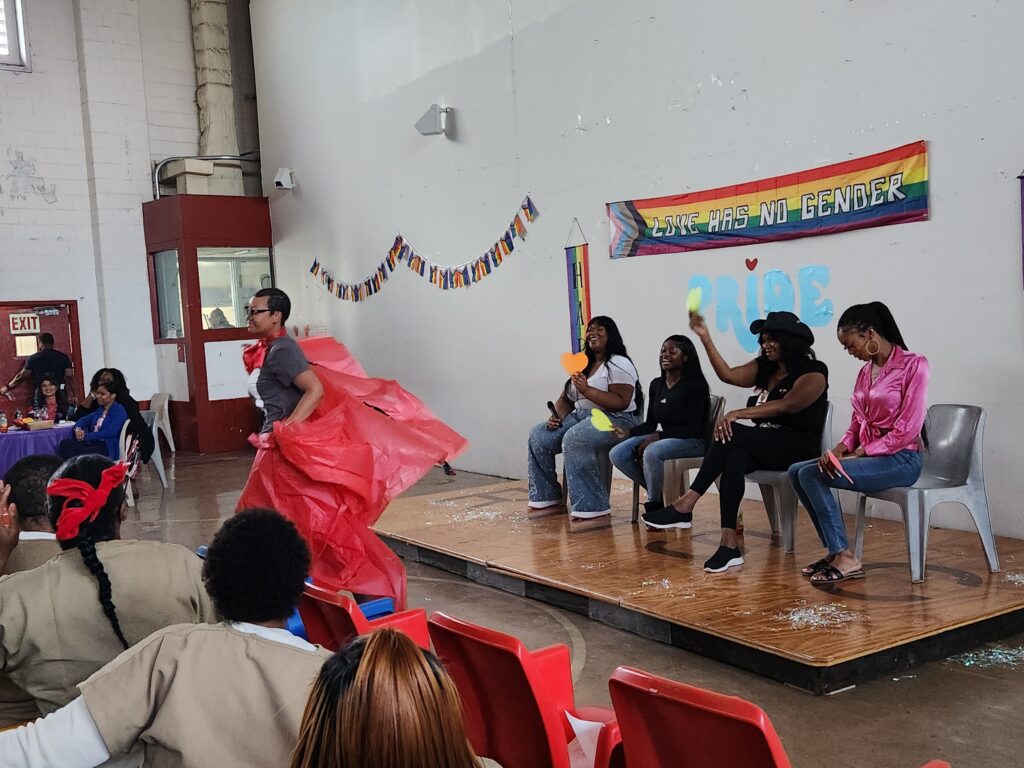
Can you explain what you mean by an “abolitionist lens”?
It’s so important that this ball is happening during Pride Month because pride and carcerality have a linked history. There would be no Pride Month without police brutality—without mass incarceration.
Rikers is a global symbol of the oppression of America’s mass incarceration and policing systems. So when we bring the arts and bring pride into that space, it is in itself a protest. We are hoping that by bringing the arts into Rikers…that this revolutionary, transformative energy of the arts is able to carry [incarcerated people] forward.
Can you describe the feeling of being at the Rikers ball?
I’d be remiss if I didn’t mention the darkness that we feel as we travel onto the island, as we navigate security, as we walk down the halls and folks are forced to stop and put their heads against the wall and their hands behind their back. It is a stomach-sinking feeling. But once we enter that room and see the faces of the folks who we came to support, there is so much empathy and so much joy.
It almost feels wrong to say that our visit to Rikers was fab, but truly, that’s the best way I can describe it. I think we came in with the intention of bringing joy and excitement to the women who were detained. We got just as much excitement as I hope that we gave them. The energy—the femme queen energy in particular—was just so palpable in the room. There was so much joy from the moment that we walked in.
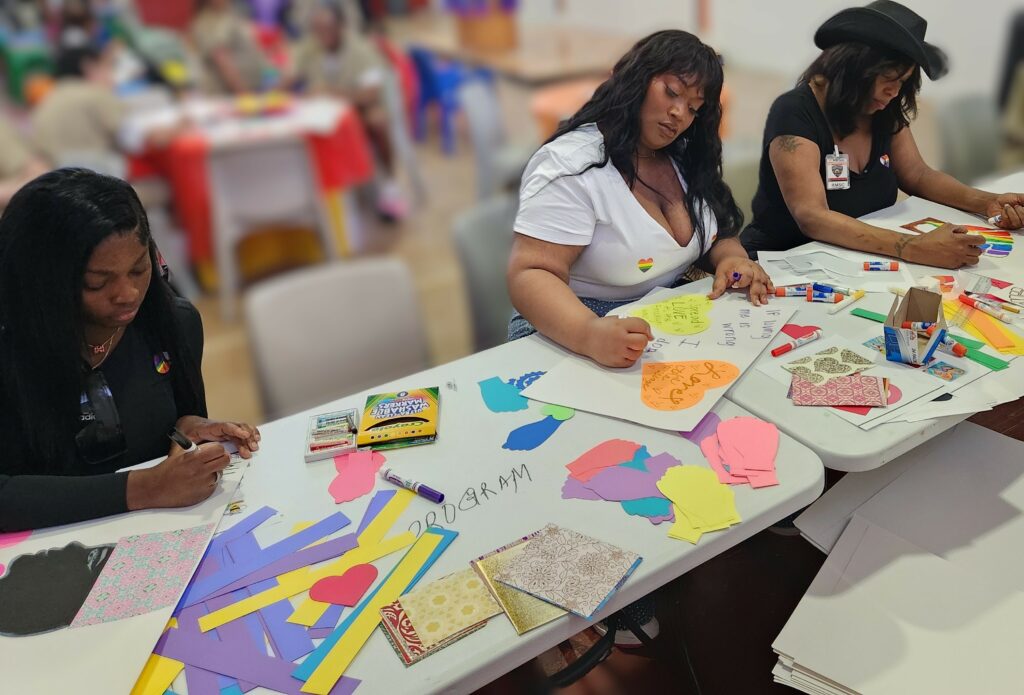
Being trans is itself an act of creation. Can you share more about how you see that link in your own work?
So many of the organizing bodies that center around Black trans folks are geared towards houselessness, HIV/AIDS, and fighting [anti-trans] legislation. These things are really crucial, but [they] aren’t focused around joy. It’s a lot of talk of loss and trauma, and that really took a toll on me in the early days of my transition.
So I wanted there to be a space where we could not only come together and center joy, but also express ourselves through the arts and have the resources to do that. [Through grantmaking and production support, BTFA fosters the careers of artists like Kiyan Williams, recently celebrated for their work in the Whitney Biennial.] There are so many of us that have never had someone to sit down and touch our hand and say: “You can do this. I believe in you. I want to see your art in the world. I want to hear your voice in the world.”
Trans people have to create ourselves in a world that tells us that we shouldn’t exist, and that is the ultimate artistic expression. We’ve already broken this gender binary and this understanding of how people are able to exist in the world, so there’s really an endless flow of possibility. As I was moving through my transness and meeting new trans people, every one of them was an artist in their own way. When people engage with art created by Black trans femmes, it allows them to understand us as human beings—and to see themselves in trans people.
What is the future you envision for Black trans femmes artists?
BTFA’s vision statement is that we envision a world where Black trans femmes can create without limitations. The headline is always “Black trans femme artists,” and I think that’s wonderful for representation’s sake. But my question is: At what point do we as artistic scholars challenge ourselves to view this art as art and critique it as such? When we start to engage with the actual work, there’s so many more important conversations that can be had.
It’s just a pleasure to be able to watch this program expand. It’s in line with all that being a femme queen is: We break barriers down and we disrupt systems. Our form of protest in this space is joy, is laughter, is cheering. We hope that they all felt the power and energy behind this too-brief but very beautiful moment that we got to share.
Updated 6/19/2024: A previous version of this story incorrectly referred to Rikers Island as a prison. Rikers is a jail facility, however, the island where it is located is a "prison island." We have amended our language and regret the error.
 Mik Beanis a social media strategist with a master’s degree in journalism. A former advisor and content producer for organizations including The Washington Post, Instagram, and AIDS Healthcare Foundation, Mik specializes in political science and gender theory.
Mik Beanis a social media strategist with a master’s degree in journalism. A former advisor and content producer for organizations including The Washington Post, Instagram, and AIDS Healthcare Foundation, Mik specializes in political science and gender theory.
Have We Been Thinking About Ambition All Wrong?
Samhita Mukhopadhyay charts a new alternative for work life (beyond the girlboss or tradwife)
BY CINDI LEIVE
Samhita Mukhopadhyay has spent her career doing two things brilliantly: being a serious boss (she helped run the newsroom at Mic and served as the executive editor for Teen Vogue), and being a serious feminist (she was a founding editor at the late-'00s site Feministing). Those dual experiences—sometimes, but not always aligned—make her the perfect person to answer the question: What does, and what should, the future look like for women in the workplace? And can you be a boss and a feminist at the same time?
Those aren’t simple questions; work, after all, is a place with its own needs, bottom line, and occasional drudgery. (There’s that old expression: If work were that pleasant, the rich would keep it for themselves.) I’ve written and talked about the subject of women and work plenty, and I still don’t have answers.
But Samhita’s new book, The Myth of Making It: A Workplace Reckoning, does. Full disclosure, Samhita is a friend and colleague: We both worked at the media company Condé Nast, although we didn’t know each other there; now, we work together at the ever-so-slightly-less-glossy outlet you’re reading right now. (We think of it as The Devil Wears Sweatpants.)
She began writing this book during the pandemic, which was—you might remember?—a stressful time for working women. We started there.
Cindi Leive: When you started to write this book, there was a lot of gleeful dancing on the grave of the girlboss. Sheryl Sandberg’s Lean In, which had been a bible of early ’10s feminism, suddenly seemed very outdated—women were realizing that if you’re underpaid, overworked, and don’t have child care, no amount of leaning in was going to fix that. But you also didn’t want to chuck the whole idea of ambition. What was the problem you were trying to solve?
Samhita Mukhopadhyay: Woman after woman in my life who were extremely ambitious in their careers were starting to question that ambition because they weren't living the life that they thought they were going to live. They weren't finding the happiness or the meaning or the purpose, and they were struggling in their personal lives.
But it felt very easy [for society] to say, “Women's ambition is dead. We should have never let you have that education and have that career. Because look what it's done to you now. You're burned out; you're tired; you're a bad mother.”
It felt like there was no space for us to be like, I'm actually in between all of these narratives. Like, I'm not going to become a tradwife, but the way we’ve been taught about ambition—pull yourself up by your bootstraps, work as hard as possible, girlboss your way to the top—that narrative is also not working for me. I'm going to do something more impactful. And I wanted to explore that.
You just referred to the kind of other side of the spectrum from the girlboss—the tradwife. Can you define that term?
There has been a trend of [female] influencers declaring that they are no longer going to pursue career ambitions and they're more focused on their family and their husbands. It's a trend that's hard to actually quantify—it gets a lot of press coverage because anything that's critical of women's ambition gets a lot of press coverage. All the women in my life have to work! But I think we are fascinated with the idea of putting women back in their place.
That's where this question of limited narratives comes in, because wanting a soft life or embracing more balance in your life should not come at the cost of women's progress. A happy life with dignity should not come at the cost of you being able to pay your bills, right? We should be able to do all of that.
But work has become so inhumane, and we conflate a rejection of capitalist hustle culture with rejecting the progress of feminism. The problem isn't that women are ambitious and they want to work. The problem is that we have a society and workplaces that can't support [those ambitions]. Especially for mothers.
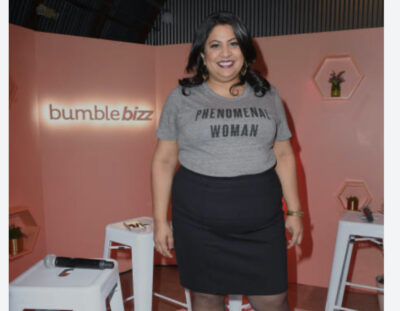
One of my favorite lines in the book is when you say that girlboss culture sold the idea that capitalism and feminism could have a totally functional baby. Do you see those things as totally at odds? Is there no place in feminism for trailblazers like Ursula Burns [the former CEO of Xerox] or Indra Nooyi [of Pepsi]—or even what you were doing at Teen Vogue?
I think the connection is not as…fluid as we had hoped. [laughs] Ursula Burns and Indra Nooyi, while they are groundbreaking, they are exceptions, right? They're often peddled to us as “You could do this, too!” And the reality is, most of us actually can't do that. It's impossible for one person to fix [the system]. It's collective action that's going to bring change. It's not necessarily that having women in these roles isn't valuable. I just don't think it's been as successful as it’s been sold to us.
You say that you don't have all the answers—you write that “this is not a how-to book.” But I’m going to push you for a little advice anyway. What’s the best way to be a better—and maybe more feminist—boss? You’re really good at it.
One of the things that I always think about is: What does it look like to have my ambition be connected to the ambitions of the people that work for me? So that I am a unit with them, and that no matter how I move forward in the workplace, my moving forward is connected to their moving forward. The research is showing that women are actually better at doing that, too: They're better at creating inclusive work environments where people feel seen. So what does it look like to shift the focus and say I will do everything I can to support my employees? Within reason, I mean; at the end of the day, we all have to get our jobs done. In some environments, profit’s gonna matter, productivity is going to matter. But I do think that as managers we can say to our employees, I will always advocate for the biggest raise for you. I will always advocate for you to get the training that you want. And for you to be able to take care of your family and to take care of yourself.
You also say that bosses need to be better about admitting mistakes. You tell a really vivid story in the book about being called the wrong name in a past role…
I was sitting in a high-level meeting and the person leading the meeting called me by the wrong name—the name of another South Asian executive at the company. It was a complicated moment: Technically, I wasn't supposed to be in that meeting; I was there in lieu of my boss. The other executive was supposed to be in the meeting, and she was not there, so it was the perfect storm for a mix-up. In the moment I was like, that couldn't possibly have just happened. But the person next to me was like, “No, that happened.”
The way you write about it, it sounds as if it was upsetting to be called the wrong name. But equally upsetting was the way it was handled, where nobody actually admitted to having done what they had done.
I did feel upset that it had happened. I already felt so uncomfortable in that room around all of these senior people. And that kind of confirmed for me that I really shouldn't be there. But—let people make mistakes, right? I use the wrong pronouns sometimes; things like that happen. I don’t think that it means that the person [making the mistake] is vicious or angry or inherently racist.
But everybody made a big deal about it, and I noticed that the focus was much more on this mistake rather than all of the forces that create a mistake like that: lack of representation for women of color in leadership roles, or lack of effective diversity and inclusion programs that actually address unconscious bias. There’s research on this: They call it the same-race effect or same-race bias; when you have not been exposed to a variety of people in another race, you tend to confuse them for each other. There's also a power dynamic here: People in management positions tend to do it more often than employees, because employees have to be very aware of the identity of the people that are managing them. And most managers are predominantly white, so you can see how that plays out. It was the conflation of all of those things in that moment. But we focus so much on the question of, “Oh, is that person racist or not racist?” And then that becomes the question, rather than how we create a situation where people of color can work with dignity.
So if someone does make a mistake like that, what is a better way of trying to deal with it?
First and foremost, by acknowledging the mistake and saying, “I am so sorry. I'm so embarrassed. Of course I know who you are. My mistake.” If you realize in the moment, do it in the moment. I’ve had to do that: “I’m sorry, I know that's not your gender pronoun, let me do that again.” It's a little awkward, but it goes a long way toward making the person feel seen and heard. And if you don't realize in the moment, admit that it happened and that you are committing to do better next time. I don't think people realize how far those apologies actually go! I really felt like I did something wrong, like, Oh my God, how dare I be here, and be Indian! So an apology helps.
There is this huge opportunity right now for leaders to really take seriously the question of how to make everybody feel included or confident or empowered at work. If you’re truly invested in diversity and inclusion, you can get to know every single person that works for you. And treat everyone with the recognition of: We know who you are, and we know what brings you here.
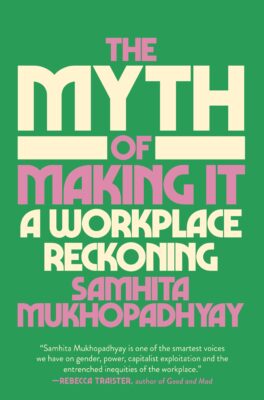
You’re talking about the importance of a feeling of belonging at work. And one of the most moving stories in the book is when you get a bad performance review and you go out to sob on a bench outside. You're in your 30s and you feel ashamed of being so upset, and you later realize that it’s because the review taps into this preexisting feeling that maybe you never belonged in that workplace to begin with. Is belonging a fundamental thing for us to think about as we redefine ambition?
Absolutely. The statistics around how lonely people feel at work are quite devastating, right? It's especially true for women and people of color, who often feel very alienated in the workplace. When we're taught that we don't belong somewhere, it's very hard to do your best work or to even show up. In my own case, my own struggles in early schooling—and bad grades—really impacted what I thought was possible for myself. And so I always felt like I was faking it, like I actually didn’t deserve [success]. I think that a lot of people struggle with that at work. And I think that working from home has caused more alienation, especially for young women, because so much of what I learned at work was being mentored by older women. And that piece is really missing right now: the feeling that someone’s invested in your career and working to help you feel included. That’s one reason people are quiet-quitting; they're not feeling like they're part of something bigger.
I want to ask you how all this ties into social change. A fascinating study just came out showing that those “lean In” messages can actually lower women's motivation to protest gender inequalities at work. Did that surprise you?
It did! I could see that individual-style “workplace feminism” has not been effective, but we still need it. I mean, I'm not going to stop telling young women that they should ask for more money!…But what I found so interesting is the finding that when you internalize the idea that your success is dependent on your behavior alone, that disconnects you from a broader story about gender justice. That research is a missing link: We have isolated women with this attitude of “to have it all, you have to do it all.” And then that internalization has blinded us to the way structural realities are impacting us.
The alternative to what we’ve been doing is that we actually come together and rise up—rise up together.
That Abortion Pill Ruling
Hi Meteor readers,
This is my confession: the other night, I stayed up until 3:30 a.m. to witness NYC workers use two giant cranes to erect a $32 million, Italian-steel pedestrian bridge outside my apartment. Infrastructure, it’s amazing! It’s expensive! I really wish someone would fund my local library!

Anyway! Today we’ve got Rebecca Carroll in conversation with author Glynnis MacNicol on her new book. Plus: The Supreme Court rules unanimously that mifepristone access is safe—at least until the next villain comes along with a better argument.
Julianne Escobedo Shepherd

WHAT'S GOING ON
Mifepristone prevails! For now!: The Supreme Court, in a unanimous decision, dismissed a suit challenging access to mifepristone for medication abortion. Sixty-three percent of abortions are administered by medication, a number that increased after SCOTUS overturned Roe v. Wade. The ruling means that, for now, mifepristone is still accessible by mail everywhere (including in states where abortion is banned; it just carries legal risk there).
The suit, brought by the right-wing Alliance for Hippocratic Medicine and represented by attorney Erin Morrow Hawley—Sen. Josh “Jan. 6" Hawley's spouse—tried to argue that mifepristone shouldn't be accessible by mail, and that the FDA shouldn’t have ruled the drug safe for abortion because it put patients at risk, an assertion that is patently untrue. During oral arguments, SCOTUS expressed skepticism as to whether the plaintiffs had legal standing, and as expected, today’s opinions, written by Justices Kavanaugh and Thomas, speak to this. Which is to say, it’s a rare win, but one with an asterisk: Kavanaugh basically provided a roadmap for future suits, writing that because the plaintiffs “do not prescribe or use mifepristone, plaintiffs are unregulated parties who seek to challenge FDA's regulation of others." That’s basically an anti-abortion bat signal—he’s essentially asking for a suit from plaintiffs who do prescribe or use mifepristone.
But! There are a few cases in mifepristone’s favor currently weaving through the legal system: in Bryant v. Stein, a University of North Carolina doctor is suing that state for its restrictions on mifepristone, and GenBioPro Inc., v. Sorsaia is a similar suit in West Virginia. And in Washington et al v. FDA, the Attorneys General of 17 states plus the District of Columbia argue that the FDA has too many restrictions on mifepristone, challenging the rules that say the drug can only be provided by certified doctors and pharmacies. Controversial opinion: I agree and make it free.
AND:
- The Southern Baptist Convention is currently on its own little rampage to restrict everyone else’s bodies. While its vote Wednesday to ban women pastors from its churches failed, the convention voted to oppose IVF under the logic that frozen embryos are people—and also issued a guidance for Baptists to pressure the government to ban it, too. Even more disturbing was SBC seminary president Albert Mohler Jr.’s vile justification that IVF is the “alienation of reproduction in the conjugal setting,” and that LGBTQ people “exploit” IVF—which is to say, Al Mohler, a freak weirdo who also believes the earth is only 6000 years old and that doing yoga is anti-Christian, wants to keep queer people from being able to have children. In related news, young women are leaving the church in record numbers. Wonder if these things are connected, or?
- The U.S. Senate, for its part, is voting today on The Right to IVF Act, a Democrat-sponsored bill which would guarantee access to fertility treatments. It won’t pass, but—as with last week’s birth control debate— now we’ll know where our public servants stand.
- Hundreds of law enforcement officers have been caught sexually exploiting and abusing children whom they met on the job, according to a devastating, yearlong investigation by the Washington Post. Yet many of the perpetrators identified by the Post have gone scot free, with almost 40 percent avoiding prison time—and over half of those who were sentenced to prison receiving five years or less. A reminder here that police were never defunded—in fact, across America, police were funded even more.
- Rep. Ayanna Pressley said what we’re all thinking about Justice Alito.
- Bridgerton’s Penelope Featherington (played by Nicola Coughlan, our Irish queen) went full nude and gently lost her virginity, in what fans say is the best sex scene of the series. Shonda Rhimes does it again!
- In celebration of Father’s Day this weekend, we revisit a conversation from Free Future 2023 with beauty influencer Cyrus Veyssi who, together with their dad, is showing queer youth the possibility of a loving and accepting future.
https://vimeo.com/870324938/184fbfa78f?share=copy

OUR PLEASURE DOES NOT BELONG TO THE PATRIARCHY
BY REBECCA CARROLL
Author Glynnis MacNicol rejects the idea that feeling good is a frivolous pursuit
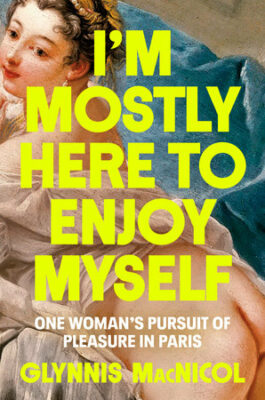
I recently decided that I’ve aged out of doing anything that doesn’t bring me some kind of pleasure, so Glynnis MacNicol’s new memoir, I’m Mostly Here to Enjoy Myself: A Woman’s Pursuit of Pleasure in Paris, might as well have been written for me, and me alone. MacNicol is single, and has written (and defended herself) extensively about this fact throughout her career (it was the subject of her first memoir, No One Tells You This). But even if you’re not single, there is something so immediately relatable, and deeply satisfying, about a woman choosing to feel good on her own terms. MacNicol, who is now 49, does that and then some with I’m Mostly Here to Enjoy Myself, which reads like an exquisitely unsupervised joyride through a sex-filled summer, with gooey cheese and good girlfriends set against the backdrop of a Parisian sky.
Rebecca Carroll: If you Google the word pleasure, which I did, the framework is invariably related to eroticism, sex, indulgence, and guilt. Beyond the patriarchy, why do you think that continues to be the narrow framework for pleasure?
Glynnis MacNicol: What I was trying to capture in this book is that the sources of pleasure for me at this age are so varied. My friendships bring me enormous pleasure. Sometimes, I think my bike is the love of my life—the movement and agency, and the idea I can get myself somewhere is pleasure. The idea of supporting myself as a writer brings me enormous pleasure. I don’t know how you can separate [any of] it from the patriarchy, though. Sarah Schulman wrote a piece in The New Republic after Roe was overturned, where she said that men have been determining the representation of women in story and structure for so long that women have internalized it to the point where we don’t understand our story outside of it—we don’t have any language around [our own representation] as being worthy of access. Even understanding that the sex in this book, and there is plenty of sex in this book, is what will likely end up selling it [to a broader audience], is connected to the patriarchy. Because when men think about women’s pleasure, they think, “Oh, she’s naked and having sex.”
I have to ask, because we are in this era of Ozempic—there’s this strange, oxymoronic thing about it, which is that here is a medication that will shut down your desire to eat, so that you can arrive at a place where your body is worthy of pleasure. What are your thoughts?
Wild, right? But whose pleasure is it now worthy of? Not your own. This book was written before the Ozempic era, and so there was none of that framework in terms of this medication that is [maybe] about restricting pleasure. I do feel like the way [Ozempic] is being used is reflective of how well-trained we are to think of our bodies as a source of pleasure for other people, and not for ourselves. But I recognize that there are very real health concerns at play. And I have not moved around the world in a fat body—I don’t experience the bias that comes with that. And I recognize the power of the pleasure you could experience by having a world that, even if you disagree with its value system, finds you valuable if you’ve only ever been punished by it.
What do you feel like you learned about pleasure through writing this book that you didn't know before?
That it’s serious. That it’s not a frivolous pursuit. If we want to talk about rethinking power structures, pleasure is as valuable a place to start as anywhere. The degree to which capitalism is based on [women] feeling like there’s something wrong with [us] that needs fixing is enormous. And in this moment, where women are losing access to abortion care, the move to rescind no-fault divorce laws portends to a future where women have less ability to control their own finances and ability to move freely, what begins to consume us is shrinking our bodies. And so a woman enjoying her own body feels very dangerous. There’s a fearlessness and a sense of power that comes in the ability to take pleasure in yourself.

Rebecca Carroll is a writer, cultural critic, and podcast creator/host. Her writing has been published widely, and she is the author of several books, including her recent memoir, Surviving the White Gaze. Rebecca is Editor at Large for The Meteor.

WEEKEND READING 📚
- On obsession: Do you know or have kids who cannot even talk yet, but are obsessed with the psychedelic babyscape that is CocoMelon? Jia Tolentino went down the neon rabbit hole. (The New Yorker)
- On sanctuary: Aude Konan wrote about the hope for Côte d’Ivoire as a safe haven for LGBTQIA+ people in West Africa. (Africa is a Country)
- On creativity: If you, too, are obsessed with the work of Julio Torres, don’t miss Cat Cardenas’s profile (or Torres's kaleidoscopic new TV show, Fantasmas). (De Los)



